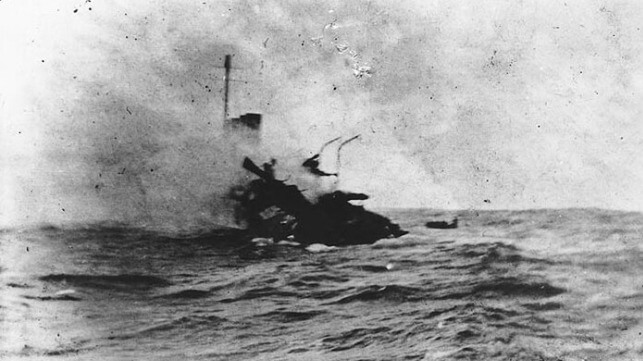UK Recovers Bell From Only U.S. Destroyer Sunk in World War I

The UK Ministry of Defense's salvage unit has recovered the ship's bell from USS Jacob Jones, the first American destroyer ever lost to enemy action and the only American destroyer sunk during the First World War. The salvage operation was carried out after a request from U.S. Naval History and Heritage Command, with support from the U.S. Embassy in London.
USS Jacob Jones (DD-61) was a Tucker-class destroyer laid down by the New York Shipbuilding Corporation in Camden, New Jersey in 1914, just after the start of World War I. She was commissioned in February 1916, well in advance of America's entrance into the war. With three steam turbines, she could make 30 knots, and she carried four 4" guns and eight torpedo tubes.
In the early months of her wartime service, Jacob Jones participated in the response to three U-boat attacks, saving the survivors of steamships Valetta, Dafila and the cruiser HMS Orama. A U-boat attack would be Jones' fate as well.
On December 6, 1917, Jones departed the port of Brest, France, and got under way to return to Queenstown, Ireland. She carried out some target practice after leaving port, and unknowingly attracted the attention of U-boat U-53.
At 1621 hours, as she was under way off the Scilly Isles, the crew spotted a torpedo wake at a distance of just 1,000 yards out. Despite attempts at evasive maneuvers, the torpedo found its target, penetrating the hull on the starboard side below the waterline, towards the stern. The aft peak, auxiliary machinery space, engine room and at least one fuel tank flooded immediately.
The destroyer began to sink by the stern. The commanding officer immediately ordered the boats and life rafts launched, and the surviving members of the crew abandoned ship into the cold North Atlantic waters. The Jacob Jones disappeared below by 1629, eight minutes after she was hit.
The depth charges in her racks were set to ready, and could not be reached in time to disarm them, so they detonated as the stern sank. Several crewmembers in the water were likely killed by the blast, and others were injured or stunned, according to the after-action report.
64 men died in the sinking or its aftermath. The number could have been higher if the U-boat's commanding officer, Kapitanleutnant Hans Rose, had not radioed the sinking ship's coordinates to U.S. and British forces, alerting them to the need for a rescue. Rose and his crew rescued two men from the water, but escaped and left the others behind. HMS Camellia, merchant liner Catalina and HMS Insolent responded to the sub's distress call and rescued the remaining survivors.

that matters most
Get the latest maritime news delivered to your inbox daily.
USS Jacob Jones remained undisturbed and unknown on the seafloor until August 2022, when the wreck was discovered by technical divers. U.S. and UK maritime preservation experts have been working to document the wreck site and preserve it ever since. The UK Ministry of Defence’s Salvage and Marine Operations unit, or SALMO, recently conducted a sonar survey to map the site and an ROV dive to recover the bell.
"The wreck of the ship is a hallowed war grave and is the last resting place for many of the 64 men who were lost in the sinking. U.S. Navy policy is to leave such wrecks undisturbed," said Rear Adm. Sam J. Cox (ret'd). "However, due to risk of unauthorized and illegal salvaging of the ship’s bell, NHHC requested Ministry of Defence assistance."
